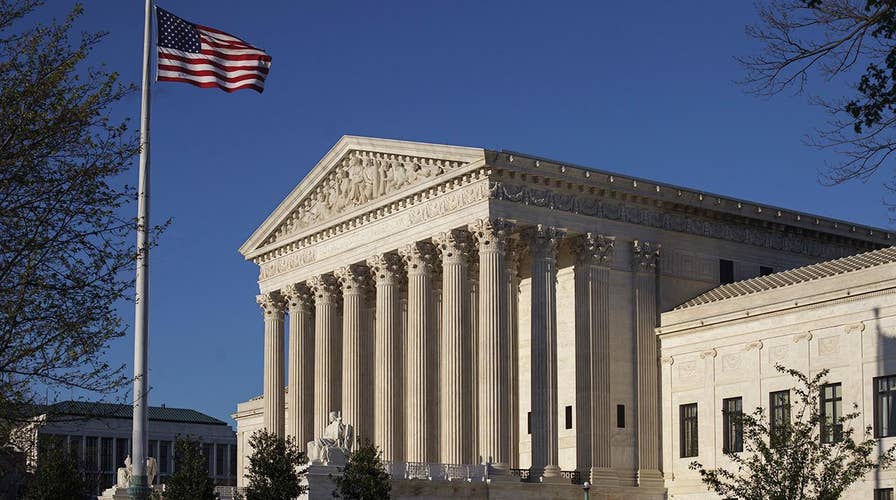Is it case closed on President Trump's travel ban?
Administration is arguing there is nothing left for the Court to do because the policies at issue have partially expired and the rest are set to expire; Shannon Bream has more on 'Special Report.'
The Justice Department urged the Supreme Court on Thursday to dismiss the pending challenge to Trump’s so-called travel ban.
The Trump administration said the questions about the second executive order imposing separate restrictions on travel from refugees and visitors from six mostly Muslim nations are now moot because of a new policy announced by the president late last month. The Department of Justice said the new policy supersedes the earlier order, and that the latest proclamation includes two other non-Muslim countries where travel into the U.S. is restricted—Venezuela and North Korea.
“The mooting events in these appeals—the time limits that were features of the [executive] order from the start—were unrelated to the litigation and certainly not an attempt to evade judicial review,” said U.S. Solicitor General Noel Francisco. “From the beginning, the order’s entry and refugee suspensions always were temporary measures to facilitate the government’s interagency review processes and to protect national security in the interim.”
In separate briefs, the state of Hawaii and the American Civil Liberties Union —representing the International Refugee Assistance Project—said the high court should stay in and ultimately decide now whether the president exceeded his executive authority over immigrations and whether his policy is discriminatory because it had targeted Muslim nations.
Critics of the latest policy shift complained the administration was afraid of losing at the high court, and created its latest policy just ahead of the now-canceled Oct. 10 oral arguments.
“This Court should once again set the case for argument and adjudicate the legality of the President’s ongoing effort to usurp Congress’s power over immigration and unilaterally ban hundreds of millions of foreign nationals—the overwhelming majority of them Muslim—from the United States,” said Neal Katyal, the attorney representing Hawaii.
Immigrant rights groups have already challenged the newest policy in court.
The high court had been prepared to wade into the biggest legal controversy of the Trump administration – the president's order temporarily restricting travel, which even Trump has termed a "travel ban." And in a boost for the administration, the justices made clear in June that a limited version of the revised policy could be enforced.
But the second temporary travel ban expired, September 24 and was replaced with what the administration said was a country-by-country assessment of security and cooperation with the U.S.
No word on when the Supreme Court will decide whether the issue is moot, but a decision is expected soon. Oral arguments set for Tuesday were canceled in light of the latest legal developments.
Trump had been incensed since his original executive order, signed on Jan. 27, was partially blocked by a federal court.
"What is our country coming to when a judge can halt a Homeland Security travel ban and anyone, even with bad intentions can come into U.S.?" Trump tweeted on Feb. 4.
He added on Feb. 11: "Our legal system is broken!"
In early March, Trump issued a revised executive order – which also had key provisions blocked by federal courts. That was the order the justices were considering before the policy was revised for a third time September 24.
At issue is whether the temporary ban violated the Religion Clauses of the First Amendment, the Due Process Clause of the Fifth and 14th Amendments, and the ban on nationality discrimination in the issuance of immigrant visas contained in a 65-year-old congressional law.
Federal appeals courts in Virginia and California in recent weeks had ruled against the administration. A majority of the 4th Circuit appeals court cited then-candidate Trump's campaign statements proposing a ban "preventing Muslim immigration."
The White House, on the other hand, framed the issue as a temporary move involving national security. A coalition of groups in opposition call the order blatant religious discrimination, since the six countries involved have mostly-Muslim populations: Iran, Libya, Somalia, Sudan, Syria, and Yemen.





